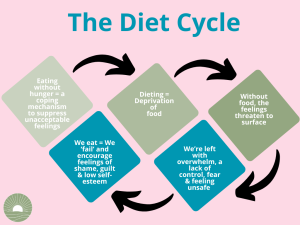I’d like to encourage you to think about the following for a minute:
- Chronic Dieting equals Deprivation of Food.
- Eating food that we do not need for energy is often a coping mechanism to push down feelings that are historically too dangerous to allow ourselves to feel.
- So when we no longer have food to hide the feelings, it is then that the feelings are able to surface.
- The ‘diet’ has enabled the feelings that food has successfully masked and this can inevitably lead to overwhelm, a lack of control, fear, feeling unsafe.
- So Chronic Dieting leads to feeling unsafe, which makes us eat again to put us into a place of emotional safety.
- But that also means ‘failure’; feelings of shame, guilt, blame, not being good enough……
- And so we diet.
And so it is with the Diet Cycle.

If you suffer from Chronic Dieting, you many also suffer from disordered eating around binging. It may be that you do this because the only way that you know that will make you feel emotionally safe again is to eat food that will mask all the feelings that you need to supress in order to feel safe.
Sound familiar?
You’re not alone.
In reality, the lack of food or any ‘banned’ substance can lead to deprivation of emotional comfort and worse still, allows buried thoughts and feelings to come to the surface.
I’ve said before that it was working as a nutritionist that made me realise the need for therapy when working with clients who had complex issues around food, weight and dieting. I did not feel that I was equipped to help clients who shared traumatic stories about why they struggled to lose weight, diet and eat in a healthy way. It felt unethical.
If you turn to food for any reason other than hunger, there is a possibility that you are suffering from some kind of disordered eating around binging. Your need for food is serving another purpose and that is often to manage trauma and emotional deprivation of some sort.
There are many kinds of trauma that may have led someone to have to suppress their feelings out of absolute necessity. It may be learned behaviour that to survive, we must hide what we are really feeling or who we really are. To receive love and comfort, only certain parts of self are allowed to be on show. Food can make up the rest of the circle. This is a great strategy for children, who are masters of developing coping mechanisms and survival techniques.
Breaking out of the Diet Cycle and becoming a Diet Survivor can be a long and arduous journey that requires the sufferer to have the time and space to explore what it is that food gives them and what they need to replace it. As an adult, we need to develop compassion for that part of ourselves that needs the food. If we are not ready to let go of the food, we can do a lot of emotional damage.
Yet, by encouraging dieting, society (this includes the medical profession) deprives people of their security and safety to live in a what they feel is a dangerous world. They need to survive, to work, to socialise, to participate in society and yet diet culture is promoting that we take away a person’s security blanket and emotional safety.
The dieting itself can become the trauma.
As a nutritionist, I can tell you what to eat to lose weight, prevent heart disease, type II diabetes, high blood pressure, skin problems and many other symptoms. But as a therapist, I can help you come to a place where you are able to manage the most important of all issues, those in your mind and your heart: thoughts and feelings.
The only way to break out of the cycle is by exploring the suppressed feelings in a safe, non-judgemental space. A space that will accept you for who you are and allow you to discover that for yourself, sometimes for the first time.
Before letting go of the comfort of food, therapeutic clients can explore what their true feelings are, where they come from and why they have not been able to feel the feelings before, in a safe and protected environment. Additionally, and importantly, learning new ways of coping that doesn’t involve eating is the key to becoming a Diet Survivor.
It is really important to stress here that going on a diet and restricting food that gives you comfort can be really dangerous and lead to other unhealthy coping strategies. If re-introducing comfort eating makes you feel guilt, shame or feelings of failure, then you may be fueling the feelings that you are not good enough.
Unhealthy coping strategies may include increased alcohol consumption, self-harm, excessive exercise and many others.
Hopefully this shows how the constant cycle that leads to both food restriction and excessive food intake can be dangerous for our mental wellbeing but worse, bring up trauma that has not been addressed.
Emotional eating has little or nothing to do with hunger. If you’re reaching for food to attend to another purpose, other than hunger, then it is likely that there is something else going on that needs attention. If we can discover what that is, then we can start to work on breaking out of the ‘diet cycle’.
And becoming a Diet Survivor.
